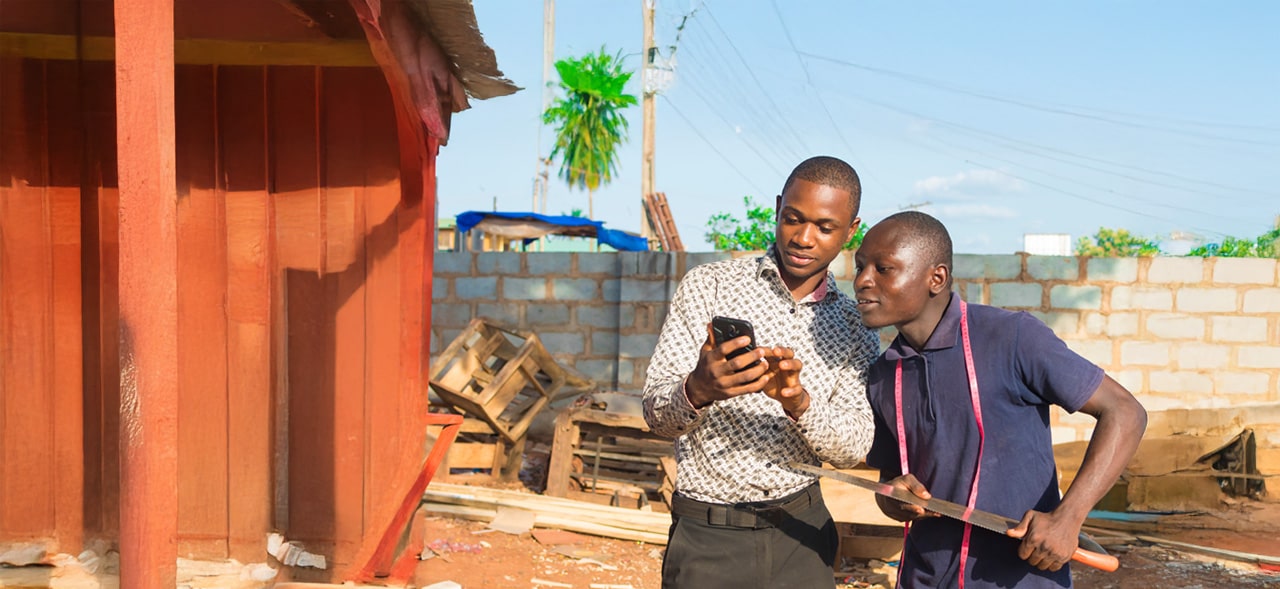
Opportunity International Australia (OIA) sought to expand its impact in Indonesia by identifying microfinance institutions (MFIs) aligned with its investment principles. Koperasi Mitra Dhuafa (KOMIDA), a cooperative utilizing a modified Grameen group-lending model, was shortlisted as a potential debt investment partner. To assess KOMIDA’s institutional capacity and alignment, OIA engaged MSC to conduct a detailed due diligence.
MSC deployed a multidisciplinary team to conduct a comprehensive due diligence of KOMIDA. The process involved both a desk-based review and a field-level institutional assessment. At KOMIDA’s head office in Jakarta, MSC reviewed core documents on credit, operations, finance, HR, MIS, and internal audit to evaluate the business model and portfolio profile.
The team also held in-depth interviews with board members, senior leadership, and functional heads to understand governance practices, strategic direction, and institutional maturity. Field visits were conducted in four branches across West Java and Jogjakarta, where MSC used focus group discussions (FGDs), individual interviews, and a sample-based portfolio audit to validate credit processes.
MSC’s due diligence provided OIA with a comprehensive understanding of KOMIDA’s institutional strengths and operational gaps. Based on the findings, OIA proceeded with a debt investment that enabled KOMIDA to expand its outreach from 150,000 to over 500,000 clients within three years. The partnership helped position KOMIDA as one of the leading MFIs in Indonesia’s microfinance sector.
Opportunity International Australia (OIA) commissioned the project.

Bina Artha Ventura (BAV), a rapidly growing microfinance institution in Indonesia, operates using a modified Grameen group-lending model. As part of its growth strategy, BAV was seeking equity investment to expand outreach and institutional capacity. Opportunity International Australia (OIA) intended to assess BAV’s suitability for investment in line with its impact and governance criteria. To support this, OIA engaged MSC to conduct an operational due diligence of BAV.
MSC carried out a comprehensive due diligence of BAV using a three-fold methodology: desk review, head office assessment, and field-level verification. The review included an analysis of policy manuals, financial records, internal audit reports, MIS outputs, and governance documents to assess operational soundness and financial viability. MSC conducted in-depth interviews with senior leadership, board members, and functional teams to understand organizational alignment with OIA’s investment mandate. Field visits to four branches—Jombang, Nganjuk, Kediri, and Mojokerto—were undertaken to observe on-ground practices. These visits included focus group discussions (FGDs) and individual interviews with staff and clients, as well as a sample-based portfolio audit to validate credit practices and customer engagement.
MSC’s findings informed OIA’s investment decision and shaped technical assistance for BAV’s post-investment support. The investment catalyzed and helped BAV attract additional funding from both social and commercial investors. The due diligence laid the groundwork for a long-term partnership and positioned BAV as one of Indonesia’s fastest-growing microfinance institutions.
Opportunity International Australia (OIA) commissioned the project.

Equity Bank, one of the largest banks in Kenya, sought to expand financial access for the country’s growing youth population. The goal was to develop savings products tailored to the unique behaviors, aspirations, and financial needs of young people. Recognizing the importance of capturing this demographic early, the bank intended to foster long-term saving habits and build a new generation of loyal customers.
MSC partnered with Equity Bank to provide technical assistance in designing youth-centric savings products. Using its Market Insights for Innovation and Design (MI4ID) methodology, MSC led a detailed market research process that included qualitative research, focus group discussions, and participatory rural appraisals. The insights helped identify key motivators and constraints in youth financial behavior. Based on these findings, MSC guided the development of product concepts, supported prototype refinement, and assisted in pilot preparation.
The engagement resulted in five new youth-focused savings products:
- Equity jijenge – A customer-defined contractual savings plan
- Equity education program – A savings product for school fees
- Equity super junior – A savings account for children
- Equity student achievers’ account – A savings account for students
- Equity youth – A restricted withdrawal savings account
These innovations had a significant impact. Youth clients increased from 13% in 2012 to 47% by 2019. The average customer age dropped to 24 years. Additionally, over 97% of transactions now occur digitally, reflecting the successful integration of youth and digital strategies.
The Equity Bank of Kenya commissioned the project.

MiDAS serves as the central data infrastructure for microfinance institutions (MFIs) in the Philippines, supporting them with credit data services and analytics tools. Despite its critical role, MiDAS faced strategic and operational challenges that limited its ability to scale and deliver secure, reliable, and data-driven solutions to MFIs. To strengthen MiDAS’s capabilities and enable it to serve as a trusted growth enabler for the microfinance sector, the Asian Development Bank (ADB) engaged MSC to conduct an institutional assessment.
MSC carried out a comprehensive Institutional Assessment (IA) of MiDAS across six thematic pillars: strategy and market positioning, technology and IT infrastructure, product and channels, people and capacity building, partnerships, external environment. Using a structured framework, MSC combined stakeholder interviews, process reviews, and system audits to evaluate MiDAS’s operational performance, product relevance, technical architecture, and organizational capacity. Particular focus was placed on assessing data security, subscriber engagement, and internal readiness to adopt improvements.
The assessment led to actionable recommendations that have positioned MiDAS for future growth. Key outcomes included:
- A roadmap to improve strategic planning and subscriber engagement through a revamped Technical Working Group (TWG)
- Enhanced usability of key products such as BARs/PODs and analytics tools
- IT infrastructure upgrades, including SQL server enhancements, encryption protocols, and data recovery systems
- Tools to reduce logical errors and automate data workflows
- Training modules for MiDAS subscribers on product usage and delivery processes
Asian Development Bank (ADB) commissioned the project.

Agriculture is the backbone of India’s economy, yet smallholder farmers struggle to access essential services, such as inputs, financial tools, and market linkages. Digital public infrastructure (DPI) can address these challenges through secure, reliable, and efficient service delivery. However, truly realizing the potential of DPIs requires an understanding of the unique barriers that farmers face across different regions. For instance, farmers in the Indian state of Bihar faced issues with digital literacy, fragmented services, and repetitive data entry, which limited their ability to benefit from agricultural programs. To bridge this gap, MSC developed Bihar Krishi, an integrated digital platform that simplifies access to critical agricultural services.
MSC designed and implemented Bihar Krishi to unify multiple ecosystems and provide farmers with a single platform for self-service and assisted access to agricultural resources. The app includes 16 modules and more than 35 features, which enable seamless navigation of government programs, financial services, and advisory tools. MSC ensured system integration, enhanced data privacy, and improved user experience to support digital adoption among farmers across Bihar’s 38 districts. MSC also conducted several marketing and communication activities for the uptake of Bihar Krishi among rural audiences.
Bihar Krishi transformed agricultural service delivery, with more than 500,000 farmers registered on the platform, 25% of whom are female farmers. The app sent 15 million advisory messages and integrated 50+ government programs, which improved access to timely and relevant information. Its recognition includes a nomination for the Future of Government Awards, and it won the ETGovernment DigiTech Awards 2025. With a vision to reach 4 million farmers, Bihar Krishi continues to evolve and integrate AI-driven advisories, carbon credit solutions, and digital financing options to build a resilient agricultural ecosystem.
The Gates Foundation commissioned this project.

The agripreneurship ecosystem in Rwanda and Senegal lacked a clear understanding of existing interventions, stakeholders, and youth engagement efforts. The ecosystem needed a structured framework to strengthen youth entrepreneurship in agriculture and enhance the impact of ongoing initiatives.
To address this need, the Alliance for a Green Revolution in Africa (AGRA) partnered with MSC to analyze existing interventions, identify key stakeholders, and provide insights to strengthen youth-led agribusiness ecosystems. The project sought to highlight areas of under- and over-investment and benchmark best practices to enhance agripreneurship initiatives.
MSC developed a youth-driven agri-enterprise ecosystem framework to assess and strengthen the agripreneurship landscape. We designed a value chain selection tool to prioritize four key value chains for youth engagement. Additionally, we conducted a policy analysis to identify regulatory gaps and assess the enabling environment for young agripreneurs. We also mapped organizations that support youth in agriculture and examined how national leadership promotes entrepreneurship in the sector. Through these efforts, MSC identified opportunities for governments and stakeholders to improve coordination and support systems and highlighted high-value interventions to strengthen the national agripreneurship ecosystem.
This project helped accelerate youth-led agricultural enterprises through the development of a structured ecosystem framework and the identification of key investment areas. It played a crucial role to drive economic growth and innovation in Africa’s agri-food sector.
AGRA commissioned MSC to lead the project in partnership with Generation Africa.





